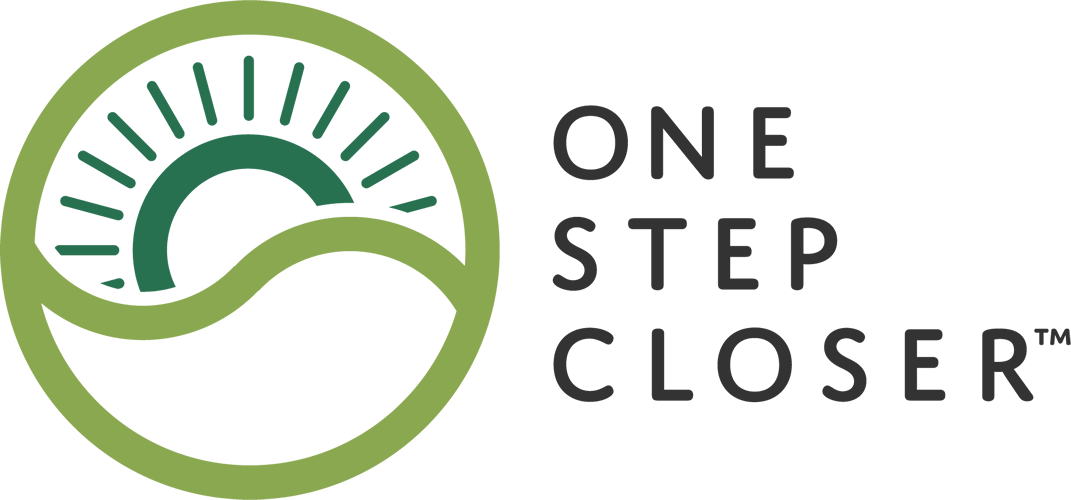July 10, 2020 by dev_team
JEDI featured on TIG Talks Podcast and Blog
The JEDI Collaborative Towards A More Inclusive Natural Products Industry With Lara Dickinson
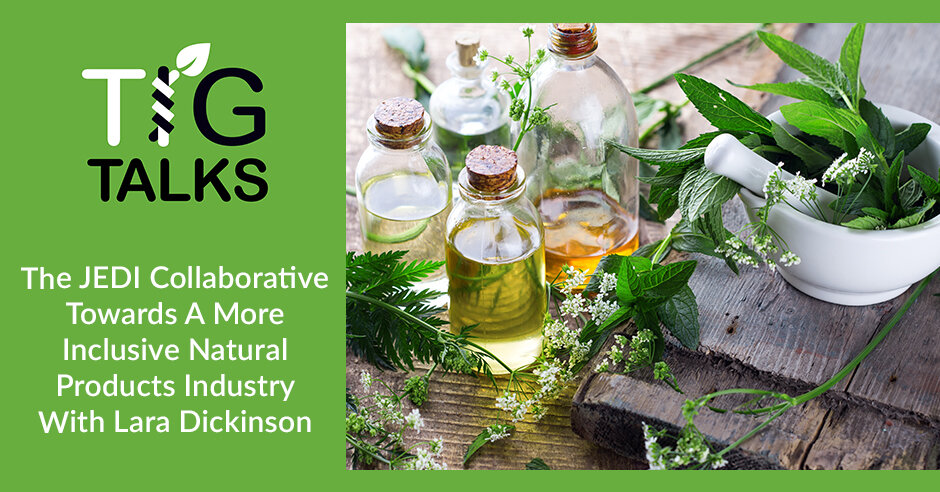
For too long, the industries around the country have been slow in recognizing and reflecting the changing needs of an increasingly diverse society. The JEDI Collaborative is committed to breaking down these systemic barriers to inclusion in the natural products industry. It is a newly-created platform that strives to get the industry to lean into justice, equity, diversity, and inclusion. Lara Dickinson, the Cofounder and Executive Director of the platform, believes that it is their mission to radically transform the industry to be more inclusive and reflect the county’s rapidly changing demographics. No time is more apt for this project’s launch than now, as America broils with the unrest sparked by systemic oppression. Join in as she talks to Elliot Begoun about the project’s vision and endeavors, and hear the stern message of inclusion they are putting out into the world.
—
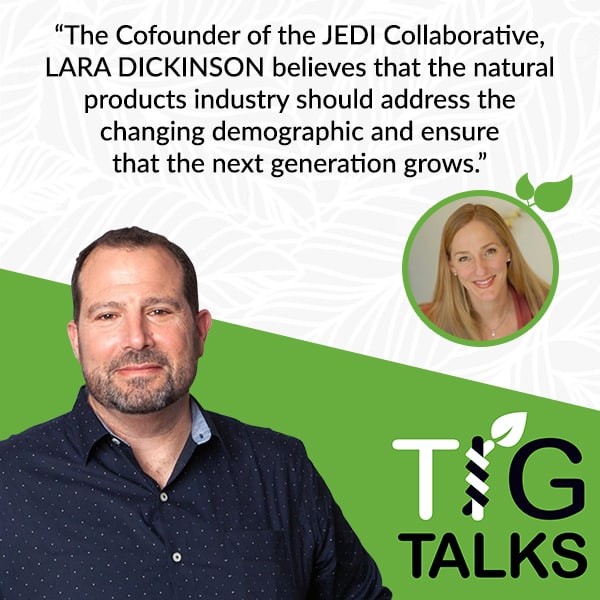
Listen to the podcast here:
I’m glad to have you here for this episode. As always, this is your event, not ours. It’s your opportunity to ask those questions that are top of mind, raw, unfiltered and in a casual way. It was critical that we have this conversation given where we are in the world and what I see and what many see as this amazing moment in time where awareness, shift and anger are all leading and pointing towards change. As we do that, there have been a lot of you who have reached out to me and said, “How do I have this conversation? How do I do it in a way that there isn’t backlash that I can share my views both internally with my team and externally with my consumers, both as founders and a brand?” I’m super lucky to have Lara join us. She’s the Cofounder, Executive Director of the JEDI Collaborative. I’ll let her share a little bit more about what JEDI Collaborative is, what they are doing, how it all started and what the mission is.
The short statement is JEDI Collaborative launched on April 29th, 2020. It is designed as a platform for the natural products industry to lean into Justice, Equity, Diversity and Inclusion. Bring that into their companies and increase the capacity for the industry to raise our game on diversity in general. There’s a ton of information tools, resources at JEDICollaborative.com and commitments that you can make. You’re welcome to look, learn, browse and see what’s there. I can certainly go into why we did this and how it came to be more.
Share a little bit why. You look a little bit clairvoyant launching this in April given where we are as a nation.
The timing was good and we’ve definitely seen a significant increase in interest and engagement. We were pretty worried launching in the middle of sheltering from COVID of any engagement. The timing was tough. We had good engagement out of the gate. The flood gates are quite open. The great thing is that this platform is ready. It is up and running for the natural products industry to use. I go a little further back and I look at the formation. I’m reflecting on OSC2 several years ago, I didn’t realize that the entire time I was telling this JEDI Journey, Justice, Equity, Diversity Inclusion, this learning journey for myself.
A lot of times, we don’t know the journey we’re on until a little bit later. I’m still on that journey. When I started OSC, I’ve been a natural products industry for many years. I’m more on the sales marketing GM side and a number of companies. Several years ago, I Cofounded OSC2 with Ahmed Rahim, who is the Cofounder and CEO of Numi Tea. We did that because we observed that a lot of companies and CEOs in the industry had incredible missions and integrity in themselves and their food. It was also hard to grow and invest so much in our supply chain and the food system, and also our top line and our marketing. We wanted to figure out how can we support each other to grow and how can we also look at big hard systems-level problems in food, natural products and address those by coming together.
It is about building or regenerate business models and agricultural systems. What I didn’t realize and reflect on until much later is when we got together, it was nine of us in my dining room in the Bay Area. Seven were white male CEOs and the two others, Ahmed and I. He is a person of color and I was the female in the room. We brought this together. What I realized is Ahmed saw, being born in Iraq and coming to the United States, being constantly the other, seeing things from a different perspective and recognizing the importance of leaning in and coming together to have a chance to grow. His perspective and maybe mine as being a little bit outsiders was what brought OSC together in the first place. There are many more stories of that.
In 2015, we had another meeting. It was a weird meeting where we had probably 13, 14 CEOs come together. We invited a group of scientists to talk about climate change. There were two of us who were women. We also happen to be in this strange moment where we had our third children. The other woman was the cofounder of Happy Family Baby Foods. We were in the room listening to the scientists talk about the gloom and doom of climate change as we were actively nursing with our covers on because we hadn’t done this before. We felt like, “If we were together, maybe we could be brave enough to bring our kids and nurse and introduce the babies to the other people in this network.”

JEDI Collaborative: It is crucial to constantly see things from a different perspective and recognize the importance of leaning in and coming together to grow.
Being in the room, listening to this in this different way gave us a different perspective, a personal perspective, a more sensitivity and an impetus to think about how does this impact us more broadly and what can we do? From that moment, that frankly was the moment where we started without knowing at birth, what is now the Climate Collaborative. Jessica and I are the Cofounders of the Climate Collaborative. That project then has grown and taken off. I imagine some people are a part of that who made commitments. What sat with me when I even got up to launch the Climate Collaborative Climate Day 2016 was that there was a missing piece, which was the biggest piece, empowerment of women and education of girls wasn’t something that we could get out through environmental solutions.
It was one of the biggest, if not the biggest solution to climate change. About a year later, Sheryl O’Loughlin, who is an OSC member at that time was the CEO of REBBL and before that, Clif Bar and Plum Organics, was also sitting with it. We came together and she asked this question that was like this a-ha moment. Sometimes we have these a-ha moments where you’re like, “This is something we can’t back down from.” In an OSC meeting, we were talking about biodiversity and how biodiversity is important and how do we lean into that more? She asked, “Aren’t humans part of biodiversity?” As we thought about it, and I started to look around and future Expo West and listen to these comments and hums around, “It feels a little bit like a country club here. It’s pretty privileged and pretty white.”
When you start to hear that, it’s hard to not see that it’s a pretty homogenous group. That is not by any intentional design, but it’s how we are at this moment. It’s also who we market to. We started to ask ourselves a question in OSC, what does that mean for our industry long term? What we’ve learned along the way is without those others, that diversity of perspective, we miss big a-ha moments. We miss other different perspectives. We miss sparks of innovation. That is something that we started to wonder, what could that mean? We also know that in our consumer base incredibly white and higher associate docket economic level in terms of who buys natural and organic products, yet our country will be majority-minority in the next twenty years.
Every second baby in the US is a baby of color that is born. How do we, as an industry address a changing demographic for our nation and ensure the next generation grows? That was one of the questions we sat with. The other is we’re not bringing the voices in that we need to ensure the vitality and the thriving of our industry without embracing more diversity. That’s how it was born. Along the way in the JEDI Collaborative, we’re doing quite a bit to also empower, increase the voices of those who are marginalized. Also, figure out ways to bring them in and make the natural products industry inclusive, and a place that everybody belongs and feels they belong.
I was speaking to someone who is an African-American woman who very qualified. It has done incredible things in our industry. She even commented, “When I go to Expo West or anything, I feel like I almost give them a visual high five to every other African-American there because I only see a couple in the hall.” I don’t feel like I belong. I feel like I have to work a lot harder, but I’ve been lucky enough to get there, understanding that’s the feeling. I’ve seen this with our industry, once there is a consciousness of an opportunity to raise our game, I’ve seen it again and again with non-GMO, fair trade and climate change. We step up in a big way. This is our moment to raise our game when it comes to JEDI and our consciousness there.
There’s so much to say here. One of the things that stands out with what you said is that as an industry when it enters our consciousness, when we have awareness, we react. I know as someone who’s been in this industry for many years, in my mind, we were always inclusive. When it was brought to my consciousness and I looked through new eyes, I recognized that wasn’t the case. That was a narrative that I could use. I agree wholeheartedly that this industry has a history of accepting its imperfections and accepting where and when it needs to change. I feel like this is one of those inflection points. That’s what excites me so much about the JEDI Collaborative and why we plan to support it as a business as well. A question in terms of this heavy lifting. This is a huge lift that you are trying to take out. How do you see that working? How do you hope to get the traction with what you’re trying to change with JEDI’s mission from the rest of the industry?
It is a huge lift. I’ve heard this before when I was working on the Climate Collaborative. I heard from almost every CEO were pitching, “We’re going to do something on climate change for the industry.” Every single person said, “That’s too big. That’s too broad. Take on one piece, take on food waste, take on the packaging,” which we were already doing with OSC Packaging Collaborative. When you’re dealing with a systems-level problem, and this is a systems-level challenge, you need to meet it with a systems-level solution. With the Climate Collaborative, we have over 650 companies who’ve committed, who have made commitments in three years. It’s blown me away. We’ve definitely exceeded our expectations and not make commitments, but are actively engaging together.
With the JEDI Collaborative, how are we going to do this? JEDICollaborative.com is live. It is available and up for the industry. There are a lot of hows, but I’ll start with where are we at and where will we go? First of all, we did a benchmarking study that Carlotta Mast of New Hope partnered with OSC on and the JEDI Collaborative. We completed that with about 250 companies. It’s not perfect because we know that a lot of times the companies who are doing the best work are the ones who responded to this survey on diversity. What we learned is that within our industry, about 2% of our industry leadership and boards are represented by African-Americans, which is a lot less than the population, which is over 13%.
We learned that about 2% of our boards are represented by Latinx and 6% of leadership, which is far less than the demographic in our country. Women are doing a bit better. There are a lot of women in the industry. I’m not blind to the fact that I’m a white female and there are a lot of us. We’re actively bringing in a lot more differentiation and diverse voices in the JEDI Collaborative to address that. I’ll go into on the women’s side. You’re looking at a small company. It’s a company of about ten people to a company that is under 50 women in leadership and on boards are doing pretty well. When you get to companies of over 50 employees, we see a pretty big drop off. There’s about 23% board representation of women.
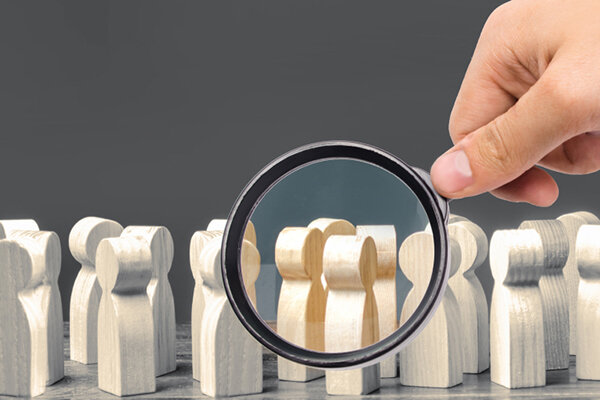
JEDI Collaborative: The industry needs to address the changing demographics of our nation and ensure that the next generation grows.
I would challenge that. It’s a little less. A lot of the companies who responded tended to have more women on their boards already. That’s still under-representation given how strong the influence of women in terms of consumers. That perspective is so important at every level including the board level. We have some baseline benchmarks for a lot of different demographics for our industry. Our goal is to radically shift that. Every two years, we will continue to benchmark and look at big shifts and measurements in 2025 and 2030, ultimately to go for 2030 looking like the US population. How can our industry look like the US population in terms of demographics? That’s the big goal.
The other big goal is that by 2025, we will have generated 2,025 JEDI Collaborative commitments to action in the industry. The industry and many companies have already shown their ability to do this. We know that making commitments and having a network of companies to learn from together and best practices and solutions works. It raises our game. That is essentially how would the JEDI Collaborative. There’s a lot there, but the baseline is we have a whole JEDI journey and a path to action. You can see the how of JEDI on JEDICollaborative.com. First and foremost, getting your leadership and CEO engaged. We’ve seen that again with many diversity blasts where something backfires in a company requires a big chief diversity officer, but it’s this thing over here in HR. It’s not integrated into the company, prioritized and understood by the CEO.
The first thing is to have the CEO agree that this is important. Make a general statement, go on and make JEDI commitments. We have been working with a team of experts. One group is called The Avarna Group. They are brilliant. They are diversity experts for a few years. A long team of advisors, you can see on our JEDICollaborative.com website to build this platform. It is based on science and the best in class knowledge of what are the commitments that companies need to make to be able to be successful with achieving diversity in a meaningful way in their companies. There were three different buckets, consumer, culture and community. In the culture bucket, that is about making company culture commitments to JEDI. It could be anything from hiring for more diversity.
There are lots of simple things. We already have tricks. REBBL, for instance, one of the simplest things they did is they marked out the names on the resumes they were taking. There wasn’t any unconscious bias of names before releasing the talent and the skills of those people. There are all kinds of interview hiring best practices and also universities and places to go recruit that are different than the standard schools. I can go on and on about that, but we’ve seen and heard a lot of studies that if you consider that person who might have gone to, let’s say, UC Merced instead of UCLA. They grew up first-generation Latinx or African-American family poor. They worked their way through.
They have against many odds and maybe a community that was not as exemplary for them in terms of others going to college have made it to college and have been successful there. That person, again and again, has shown to potentially be a much stronger employee staffer entrepreneur than someone who was handed an easier path. When we start to think in that way, we realized there are a lot of opportunities out there that our industry is missing. I’m going on and on a little bit and happy to fill that assumptions, but there are many commitments that can be made. There are a lot but the first, second, third, fourth steps, if you take it in steps, it’s not that hard.
A question around that, most of our audience, we have a pretty shy one evidently. Most of our audience is early-stage founders. How do they make this commitment early?
This is the perfect time to make the commitments. The founders themselves, you can make JEDI commitments and we encourage you to make a JEDI statement. We have a whole webinar on how to make a JEDI statement. It’s very simple, but it basically frames up your thinking, “What am I going for? What do I want to accomplish with JEDI? Is it inclusive hiring? Is it more diverse boards? Is it a supply chain where we embrace and uplift those in our supply chain more and think about the vendors that we work with?” There are many different areas. We encourage you to make a JEDI statement. A lot of times people will say, “I don’t have the resources, the time or the funding to be able to bring in someone to do this for me.” All this is set up. They’re very simple steps and a set of thinking that you can go into.
It’s set up for entrepreneurs that are starting their companies and early on their journey. Start by making that JEDI statement, making commitments in the area that matter to you most. Participate where you want to. This can be done on your own JEDI journey, but there will be in our already active webinars and tools, case studies, resources along the way. For companies who are leaning in and are successful, we’re ready to showcase and spotlight. New Hope is a very deep partner of ours. This is a big intention to be able to make this a real focus for our industry and a celebration. I will give you a sneak peek. I can’t tell who, but we’re signing the MOU. There are some big distributors and retailers who are leaning into this with us. It will be a part of the real lens in thinking of how companies differentiate themselves longer term.
We started our JEDI journey. We’re working on our commitment and our statement. I’ll tell you that the conversation that comes from it caused us to do everything. It relooks even our application and the information we asked for and get the levels of commitment and so forth. There’s also a way, for anyone interested, especially any service providers to donate, to put your money behind this as well. We’re going to be doing that too. Another question, a little bit more general is that we’re in this moment in time where this is obviously top of mind for everybody. What guidance and suggestions do you have? I’ve been getting lots of questions from people about, “How do I respond on social media? Do I post? I don’t feel like I have the voice to post or do I not post? What happens if I don’t?” All of these kinds of questions. My guidance whether that’s right or wrong, as a middle-aged white guy, I don’t necessarily have the best perspective here. My guidance has been that a brand is a motive extension and has its own voice and being true to that voice. It’s just to speak the truth. If there’s a backlash to that truth, then that’s okay. I’m curious as to your guidance.
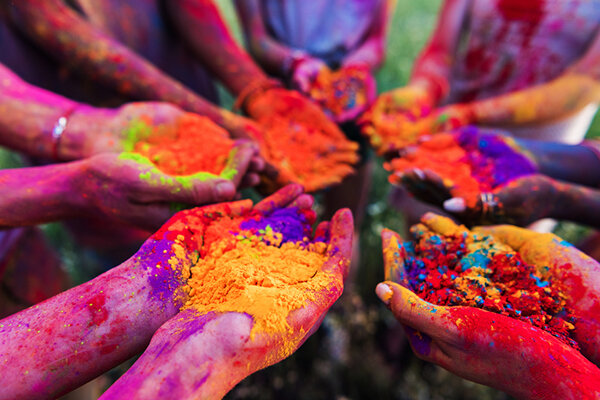
JEDI Collaborative: The JEDI Collaborative seeks to radically shift the underrepresentation of women and people of color in the natural products industry.
We’re all on this learning journey together. I first want to say that I am not a JEDI expert, but I will tell you what I’m seeing and what we’re learning and discussing together. I’m a natural products industry person that is bringing in experts to support us. We had this conversation with about 30 of our 37 OSC member companies. What do I do with our strategy group, The Avarna Group? It’s definitely on the top of mind. The first thing to think about is exactly what you said, Elliot, “Is this authentic to post?” I’m seeing that there’s a little bit of a hesitancy. Even this community is largely non-diverse. There’s a nervousness like, “I don’t want to mess up.”
There are these new terms we’ve heard like performative allyship where suddenly someone is out putting social media posts, we support black lives and posters of Black Lives Matter. Creating a lot of noise in social media without a backup of authenticity or action. There’s been some real backlash against that because it’s dampening the voices of the people who are living these experiences and have something to share and deserve are listening in our empathy at this point. It’s a careful balance, yet most companies are struggling because you’re like, “Everybody’s saying something, so I’ve got to say something now. What do I do?”
First of all, I saw Ben & Jerry’s is leading into this work. They made a great statement. They can back it up with authenticity. That statement makes sense from that standpoint. Annemarie Cosmetics, who is an OSC member company, made a statement that was a little different. I thought that was where of most people and brands should go at this point unless you’re already deeply participating in JEDI. They acknowledged that we have a lot to learn. We need to continue to increase the diversity of our team and embrace new consumers. We celebrate those companies owned and operated by African-Americans. Instead of saying anything else about themselves, they shared and promoted eight different African-American beauty and natural products companies that they admired to their entire social media-based, which is pretty extensive because they’re a very online community.
This is a time to be generous. That was more of a generous statement and thinking in that way versus trying to call attention to ourselves unless you’re truly doing something impactful. Overall, what we’re talking about within OSC and JEDI, and I advise companies that this is the time to listen, look inward and do your own work. Ijeoma Oluo is the brilliant author of So You Want to Talk About Race. She keynoted our launch to the leadership of the industry. Her video on this talk is posted on JEDICollaborative.com home page. She’s stunningly amazing and beautiful. She’s this luminous, sensitive, soft woman and hard as can be on us at the same time, which I thought was a beautiful combination. She said, “This is the time to clean your own house. If you want credit for cleaning your own house, get in the back of the bus. That’s what we need to do.” This is a time to listen to your employees and start to think about internally how to make changes versus making external statements unless you have something authentic to share.
You said a few key things to me. One of my favorite words and it’s something that I talk about as being a superpower in general, which is empathy. A lot of people feel like they have a FOMO of not saying or not being present, but I don’t think that’s true at all. If you feel that you want to participate in this dialogue, but you don’t necessarily have a specific statement to make or anything that’s going to ring authentic. One suggestion I would make is making a listening offer. At this moment, we don’t have much to contribute to dialogue other than a willingness and openness to listen because that’s what needs to happen. You made that point being a vessel to listen, to hold that is an important thing.
That does not ring inauthentic if you’re willing to do it. You’re inviting dialogue. You’re inviting conversation. You’re inviting potential criticism. Instead of feeling you have to respond or defend that criticism, you should use that as an opportunity to improve and improve your messaging as well in response. A couple of other questions since we had a shy audience and I’m not surprised because I do feel like a lot of people are uncomfortable with how to voice this. Regardless of where you are or have this conversation, as people, we’re less reluctant as brands trying to protect our position, unfortunately we tend to sometimes cower in these things. From a perspective, when a brand does get backlash, when they do get pushback from their statements, any suggestions on how they navigate that?
We’ve seen that a lot. It’s openness, vulnerability, transparency and humility. I want to encourage that with this. I do not profess to be an expert or even a role model myself in this work, nor do most of us. As an industry, first of all, I find it sad and upsetting when someone gets called out in a negative way for not being appropriate in their wording if they’re trying their best. I want to encourage in this environment here in JEDI in general, it’s about creating a place of support and safety to come together and raise our games. In terms of what to do if you get backlash, I think it’s that being open acknowledging that we’re not perfect.
We’re on this journey and you’re on this journey. We all are and here are some things we’re now looking at and learning to do. Unconscious bias is the buzzword now. JEDI Collaborative has a whole webinar already prerecorded with interaction that you can go and download and say, “I and my team are engaging in unconscious bias training with people we trust and experts.” That can be done anywhere or whatever the challenges or looking at our hiring practices and aiming for more inclusive hiring practices and pointing out one or two ways that you might be looking at to continue to grow your company in that way.
I have a couple of other questions around that. I’m full kimono. I’m fine with being vulnerable and open. This is a conversation that used to be hard for me to have because I am a product of their lives. There’s no doubt about it. Part of my internal dialogue and justification was growing up culturally Jewish and being very aware of antisemitism. I felt like I had that some degree of experience of othering, but that’s not true. That’s narrative. For a long time, I struggled with how do I put a voice to this? How do I stand for change in ring authentic? What I’ve learned personally over time is that the best way to do that is to be vulnerable and is to listen.

JEDI Collaborative: Start thinking about making changes internally, instead of just making external statements.
It’s okay not to have a strong opinion or ability to be truly empathetic because you don’t know what it’s like to walk a mile in their shoes. You have no idea. The other thing I look at is I have three kids, two of them are powerful women. One of them had a baby, who’s a baby of color. There’s that too that brings that forward to me. Overall, for those that don’t know how to engage, who are cognizant or wary that they don’t have the right perspective or place to be a part of this conversation. What have you heard from those experts that you work with? What counseling can you offer?
I believe one of your last talks, you talked with Ryan Pintado-Vertner a little bit about empathy and vulnerability, which is powerful. He has a professional lens. You’ve got people like Brené Brown who are starting to bring this up in a lot of ways for us to learn and think about. There’s some good stuff out there. To be an expert on this, I can’t profess to be, this is hard work. For me, this was only a few years ago did I realize vulnerability is a power. It’s a strength. It’s not a weakness. I grew up thinking very differently. I grew up a product and frankly, white privilege as well. Going in Huntington Beach, California upper middle class and a good school for college, another good school for grad school and beyond. Moving into the CPG world, it’s all about sometimes a different way of thinking.
It’s very much about the competitive matrix, Michael Porter’s model focused on, “What’s my point of difference and how do I ruthlessly focus on that one thing and how do I do that as myself?” These are skills that I didn’t learn. Most of us didn’t learn if we’re a child of the ‘70s and ‘80, which a lot of us are. I see the next generation being a little different. I noticed even my eleven-year-old, maybe not so much, she’s more. My 9-year-old and my 5-year-old, they’re teaching me about empathy and listening. They’re being taught that in school to respect difference, to listen, to apologize and to hold space. It’s something that can be learned, but it’s a little bit wired into us culturally. Expecting people to be vulnerable and be good at it. We all need to be vulnerable and giving ourselves the chance to learn to be vulnerable and not be good at it.
There’s a much deeper conversation here that I’m starting to research. I’m not seeing a lot out there about. I’m reading this one of the first books on indigenous culture in the native American-Indians. It wasn’t something I learned in school. My kids are learning about the native American Indians instead of the missions. I learned about the missions, what a flip, and how great the missions were. Now, it’s completely but the backbone of our country is a scary thing to look deeply at. Once we start to look deeply at that, it starts to dismantle some of the ways we think about ourselves. Colonizing, that’s being colonial. That’s considered a romantic word. Colonizing means taking what’s not ours and extracting and using what wasn’t given to us or offered to us. It was taken.
We took a country. We built it on the backs of other people and we did a pretty good job of that. There’s a point. I’m also reading Collapse, which is another book from a few years ago around every civilization runs up against their limits. We’ve had a much longer run rate because we’ve had a more forgiving empire in our nation and globally to allow us to do that. We’re starting to hit our limits and then you either don’t thrive or you change. Not to put too much pressure on us, but the natural products industry and food is a nodal point for the culture of our country and the world to change. This is why I do this work. We are such an important place to create a ripple impact for change and thinking.
We grew up and we learned to suppress our feelings and our vulnerability. I truly believe a lot of that was because as a nation, we needed to disconnect from the people that we took things from to be able to justify what we did and what we’ve done. That disconnection has created a big wall. I’m going off on a limb here because maybe this is what you want. We don’t talk about this stuff at JEDI. I do think we need to get to this point somewhere along the way, which is we have built a wall around ourselves to justify and to protect our power.
There’s a point when you look at us and you realize, “Have we reached the limit of our power?” We’ve been talking about this for a while, but Mother Earth is starting to give us a big feedback piece. We talked about global warming being a gift because it’s a massive feedback loop to say change because you will not live. If you don’t change, I’m giving you the signal. There are many other signals like this from the human side that’s being very siloed. It’s not in us, but adapted narcissism, adapted egomania because I don’t think we’re necessarily like that. We’ve almost needed to be that way to adapt to the system, which has grown in a manner that the only way we can keep it going we think is to defend our power in our space.
I’ve been trying to make sense and I’m going to take the risk of being semi-political here, trying to understand the madness of all the shit that we’re going on. I do self-justify that if you look historically the greatest periods of change, come post the greatest periods of disruption. One of the things is very interesting and that I found curious, we have a few questions, so I’m going to jump to that. I feel like the veneer has been pulled from our surface a bit. We are in this moment of time where we can’t help, but see that as a nation we’re deeply flawed. We can see that we’re deeply flawed now, we can accept that we always have been. Whereas before, we did such a good job of our own national narrative about being the perfect nation, the perfect union.
It was very difficult to go backwards and see all the things we screwed up along the way. Now that we see that we’re wildly dysfunctional, we can also own that dysfunction and all of our prior dysfunction that excites the hell out of you. That’s where change is going to come from. We’re not having to try to defend or sweep things or justify things that were awful. All of them are awful. A couple of questions, “What do we tell people that are flipping the conversation and saying that those who complain about systematic racism are placing blame on others for their own failures?”
Those who complain about systematic racism are placing blame on their own failures. I want to pause for a minute and hold that because there is a lot of blame. We all see that. I almost wonder if we look more at the word blame itself. Blame itself is a defensive mechanism for avoiding vulnerability. It’s a protective measure and it comes from anger, which is usually masking sadness underneath it. I don’t know that I’m giving you a good answer as much as what I believe is deeper psychologically, which is those are people who haven’t been brave enough to look at themselves in their own vulnerability yet and overcome that. They might almost deserve to be handled like a child. A lot of people aren’t ready. They’re still in a childlike phase with this.

JEDI Collaborative: Vulnerability is a strength, not a weakness.
Blame in my mind is another form of bothering. It’s another form of deflecting ownership for our culpability and where we are. The reality in my perspective is we all own a part of that culpability. Nobody is above ownership on it as a whole. I don’t know that there’s a benefit to blame and that’s how I would respond. There’s a benefit for talking about progress. There’s a benefit for talking about how we move forward together, those types of things. My mom goes on to say, “Some people say that minorities are placing blame instead of owning their success or lack of it.” I’ll give you a second to think about that, but that’s deflection. It’s people who feel vulnerable that they’re giving up power if they admit that exists. This is my opinion. I’m further from the expert.
I’m hopeful and maybe I’m a little idealistic that is starting to shift, but I agree with that. I’ll even admit that I felt that way growing up. It requires getting to a place of empathy to understand especially African-Americans and indigenous people. Many people we call it black, indigenous and different people of color. There are different groups, but those people were brought here. They landed here against their will, not everybody. Systematically, when you look at their lives, that’s hours of conversation, but if I even think about our industry, it didn’t hit me.
We have this on our launch video. One of the women, who is the founder of a coconut ice cream company, and this is when it hit me, she said, “I know my product is great and I know I’m smart and I worked so hard. I’ve been trying to raise money for the last four years and no one will people lean in. I realized that I didn’t grow up in the community. I don’t have the friends and family to give me that first $500,000. I don’t have the network that a lot of people have. I had to work so hard to even get to a point to have anyone hear me.” There’s this almost like weariness, where it’s like they have to work 3, 5, 10 times as hard to even get to the point of being at the table with us. They’re already tired when you think of that. When you can’t hold space for that, how much further there already working to even be able to be at the table? Give them a voice. Let them be heard and listen to their perspective. When I listen, I’m blown away at what I can learn, but we haven’t learned to shut up and listen. That’s one of the biggest powers we can start to have.
One last quick question because I know also you have at time and then I want to give you an opportunity to make sure people know how to reach out if needed. Beth asks if you have any suggested reading lists or anything along those lines, for those that want to dig a little deeper and spend a little time contemplating and getting a better understanding. Any books or suggestions?
On JEDICollaborative.com, we have a reading resource list and a lot of other resources, some cool stuff. So You Want to Talk About Race by Ijeoma Oluo is a good one. You can get her cliff notes by watching the video at our launch too. White Fragility is another good book. There’s reading and then there’s also personal development, thinking, listening, and balancing that with both. It depends on how this reaches you. When I brought this to the OSC CEO network, some were like, “Yes, this is the right thing to do. We need to lean into it.” Others were more moved by, “I didn’t know that,” which we think we all know when you look at the McKinsey and the Harvard Business School Studies and all these different research pieces in Forbes and now Goldman Sachs that if you’re reading this stuff to realize that lack of diversity of perspective in your company will hold you back. That is plain and simple.
There are many studies about that. It may not seem like that short-term because decisions are easier. There’s an African proverb, “If you want to go fast, go alone. If you want to go far, go together and go together with a broad group with broad perspective.” They’re all on our website, JEDICollaborative.com. Studies that show that innovation revenue is significantly higher when you have more diverse teams, that growth is higher. Goldman Sachs stopped taking any company public that did not have diversity on their boards, a clear set of diversity in their leadership teams. They said this had nothing to do with it being a public statement play. It was because they looked at companies that they took public in 2006, 2007 before the last recession.
Those with more diverse teams significantly outperformed those through the recession and were significantly more resilient and significantly higher valuation than those with less diverse teams. I encourage you to read different things to understand that this is not a one-trick pony. This is a systems-level challenge we face. Solutions are systems level, but we’ve mapped it out. It can be one step at a time, just take one piece if you want, but start to understand it and absorb it personally. The more you do, the more you will see that it leads to greater success for companies.
Thank you one for being here. Thank you for doing this heavy lifting. I commit that me and TIG as a whole agreed to be an active participant and want to help the JEDI Collaborative and also want to be part of this dialogue. I believe everyone here does. Any last words of wisdom or if anyone wants to reach out, is it best to go to the website?
My email, Lara@OSC2.com, is right there on the website. You can reach out to me or go to JEDICollaborative.com. You can start making commitments. It’s free. It’s all designed. We’ve invested a lot of time and money to get it to this point because we believe it’s important for the industry to start to embrace it. That’s the first thing you can do. We’ll be making some announcements. The industry deserves some good news and we all deserve some good news. It’s been tough. JEDI Collaborative, right before all of the national trauma we faced with racial unrest, we achieved full funding of the project.
We’ve been careful to not announce that publicly because since then the need, the engagement and the acceleration of this project has increased. We’re looking for another $75,000 on top of that. We’re announcing that we are majority funded, the project is available and it will continue to grow significantly for the industry and on behalf of the industry. If you make commitments prior to that announcement to the entire industry, you’ll get recognized as one of the companies who’ve early on made commitments and is starting to lean into this work. Please consider making commitments.
Thanks so much for joining. I appreciate the conversation.
Thank you for having me and leaning into an important difficult topic together. Thank you so much.
